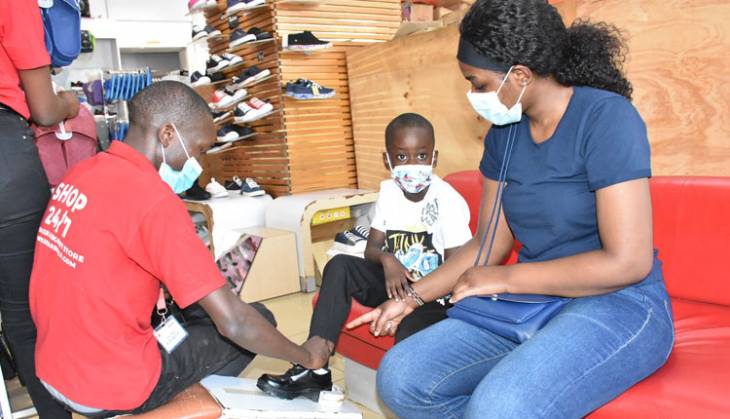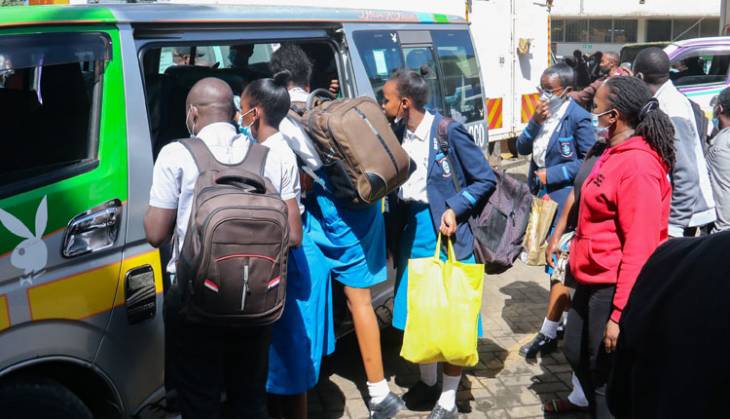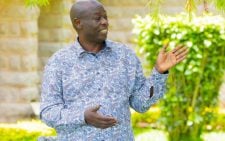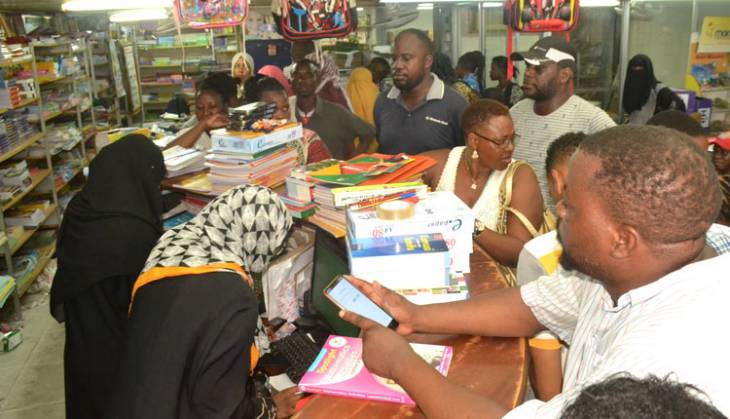Harsh reality for parents as schools reopen

It is a harsh reality for parents and students as school managers moved to implement new stringent measures aimed at curbing indiscipline that was witnessed last term forcing some institutions to close early.
Some of the measures, which saw parents already feeling effects of harsh economic realities dig deeper into their pockets, included catering for drug tests for their children.
Learners were required to show a test certificate before being admitted back.
Those without certificates or those whose results turned positive for drug use were turned away with their fate now lying in the hands of schools boards of management (BOM) that will decide whether to re-admit them after counselling or expel them.
The fate of thousands of students with pending disciplinary cases as a result of unrest and arson remained pending with BOMs scheduled to determine each individual case at later dates.
All students from schools that witnessed unrest last year, besides being required to have the mandatory drugs certificate, were also expected to have certificates of guidance and counselling from a qualified counsellor or psychiatrist, pay all penalties for reconstruction of damaged property and clear school fees arrears before admission.
Students who have appeared in court over arson or unrest are expected to remain at home until the hearing and determination of their cases.
Those who would be cleared by the courts may be readmitted to the schools depending on the resolutions passed by BOMs, while those convicted could see their future ruined.
In a bid to control the unprecedented indiscipline in schools, the government had in November introduced a raft of tight measures, among them empowerment of BOMs to discuss and decide the fate of wayward students.
The new regulations have also made it difficult to transfer students involved in indiscipline to another school.
“Ensure that all students involved in any form of indiscipline are not allowed to transfer to any other school.
Therefore, no school should admit a student who has not been released formally by the previous school,” read a circular released on November 9, 2021.
The Directorate of Criminal Investigations (DCI) has been roped into the matter and has disclosed that affected students’ criminal record would be indicated in their Certificates of Good Conduct whenever they apply for one.
The decision, according to DCI boss George Kinoti, would enable employers to know the criminal background of students involved in the arson attacks on learning institutions.

“This will be a permanent criminal mark that will bar many students from achieving their goals as no employer of worth will dare employ such characters. In other words, their future is as good as destroyed,” Kinoti said.
For instance, at Maranda High School, which was among those hit by unrest last year, students were subjected to a further drug test, under the watchful eye of officials from the Government Chemist, to prove the authenticity of the certificates they had acquired from government health facilities.
Government chemist
Maranda Principal Edwin Namachanja said the school would only allow those students whose certificates had been authenticated by the Government Chemist, which the school had hired for the repeat test, to go to class.
“The idea to go for a drug test was mooted last year during a stakeholder meeting, which was called after a second dormitory was burnt just two weeks after the first one with a capacity of 400 students was razed,” Namachanja told People Daily.
The principal said they had adopted the strategy to identify those under the influence of drugs and place them in rehabilitation, in a bid to tame increased cases of indiscipline in the school.
People Daily established that some students were forced to book guest rooms around the school yesterday after they were sent back for failing to produce the test certificates.
Namachanja insisted that parents must ensure their children get tested, adding that without proof of testing, they would not access the school compound.
“We have staggered the reporting of the students to allow the Government Chemist to conduct the exercise without any hitches,” he said.
He asked parents to take their children for the tests while still at home to avoid situations where they are sent back.
“We expect the parents to take their children for drug tests and give consent for further random testing in the school,” said Namachanja.
In November, each of the 2,469 students at the school paid Sh2,500 for reconstruction of the first burnt down dormitory.
A week ago, a stakeholders’ meeting at the institution resolved to deploy a permanent chaplain at the institution.
Similarly, the school management sent a notification to parents last week, directing them to ensure their children undergo a drug and substance test before they are readmitted to the institution.
Further, each student was required to pay Sh5,125 for reconstruction of the second dormitory, with parents expected to pay full school and rebuilding fees before re-admission.
“The exercise must be done at a public health facility or Nacada. The certificates of the same are to be presented on the re-opening day. Subsequently, there shall be random testing conducted by the school,” read the notification.
Each drug test cost parents Sh1,500.
Yesterday, Education Cabinet Secretary George Magoha supported the move by Maranda to take a compulsory drugs test.
Magoha regretted that some students were hooked to drugs.
He said the Ministry will work with health partners to randomly visit schools and collect blood samples from students for tests.
“This is one of the strategies the ministry and security officials have come up with to control increased cases of arson and indiscipline in schools,” said Magoha.
Disciplinary committee
Sources at the Ministry of Education intimated that the government had trained its eyes on schools with a history of indiscipline such as Maranda, Sigalame and Butula (Busia), Buru Buru Girls (Nairobi), Kiriani and Kangema , Londiani, Mama Ngina, Thumaita (Kirinyaga) and Garissa High.
At Kakamega High School, learners reported back on Monday and yesterday while those with indiscipline cases resume tomorrow, accompanied by their parents.
Students with indiscipline cases are expected to report back with guidance and counselling certificates on drug abuse from certified practitioners.
The students are expected to have attended at least three counselling sessions, each of which cost at least Sh3,000.
At Molo Academy Boys Secondary, which also witnessed a series of unrest last term, students with court cases were asked to stay at home as the rest resumed yesterday and today.
According to the management, those with court cases will remain suspended until January 14, when they are expected to appear before the BOM disciplinary committee to explain their conduct.
The National Authority for the Campaign Against Alcohol and Drug Abuse (Nacada) last week urged parents to take time to discuss alcohol and drug abuse prevention strategies with their children.
“Drug testing should be part of a comprehensive intervention programme. Adequate resources allocated should be available if one fails the test,” said Nacada on its twitter account.
Siaya County Education Director Nelson Sifuna said the drug test was a suitable strategy to detect addicts whose actions have cost loses to schools in terms of damages incurred as a result of burnt infrastructure.
“We have been concentrating on academic welfare of students and the drug test gives us further details of the children. Parents should embrace the idea since it will help them know their children better. We are helping parents and they should support us to achieve our target,” said Sifuna.
Siaya Kenya Union of Post Primary Education Teachers (Kuppet) secretary Sam Opondo backed the move and asked the government not to restrict the test to Maranda but include other schools that faced similar predicament.
“We need to have drug testing in schools to help us to establish addicts or abusers of drugs,” said Opondo.
However, Mt Elgon Kenya National Union of Teachers (Knut) secretary Stephen Chemonges asked the ministry not to force students to do drug tests.
Chemonges said drug testing will scare many students from reporting back and could slow down the transition rate in schools.
“Let students be allowed back in schools without many procedures on drug testing, this thing will make many students skip school,” he said.












